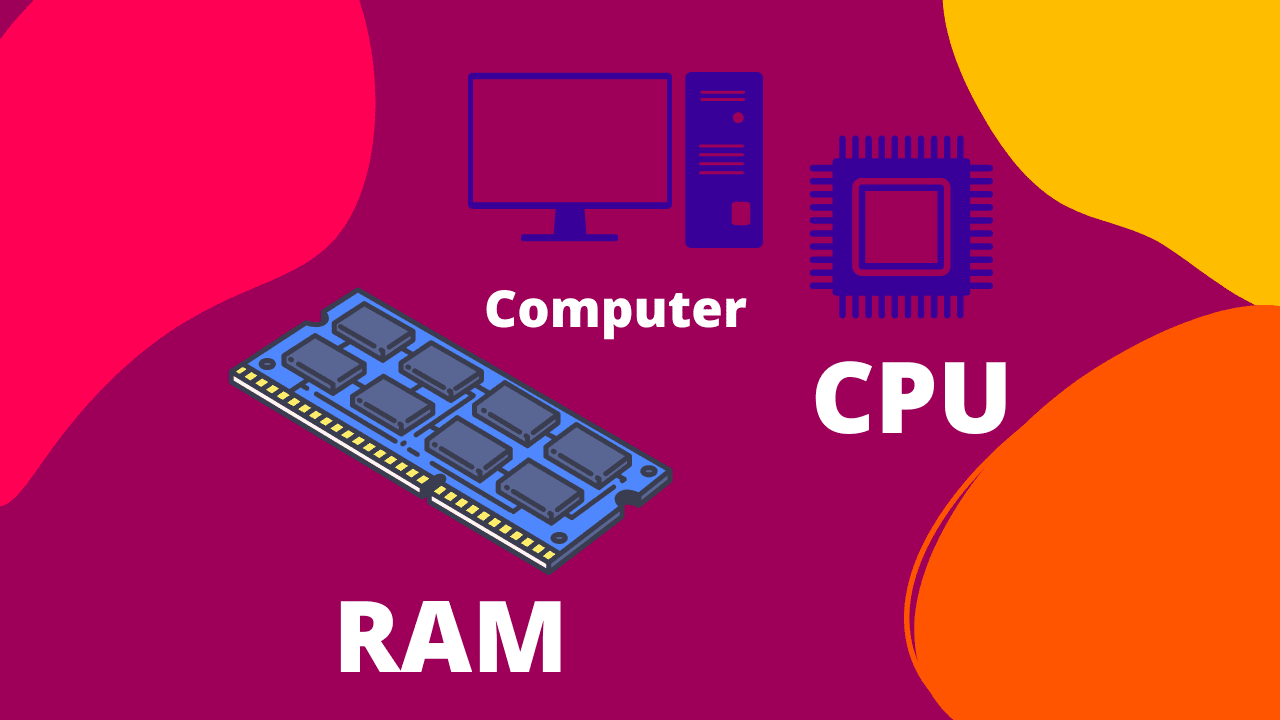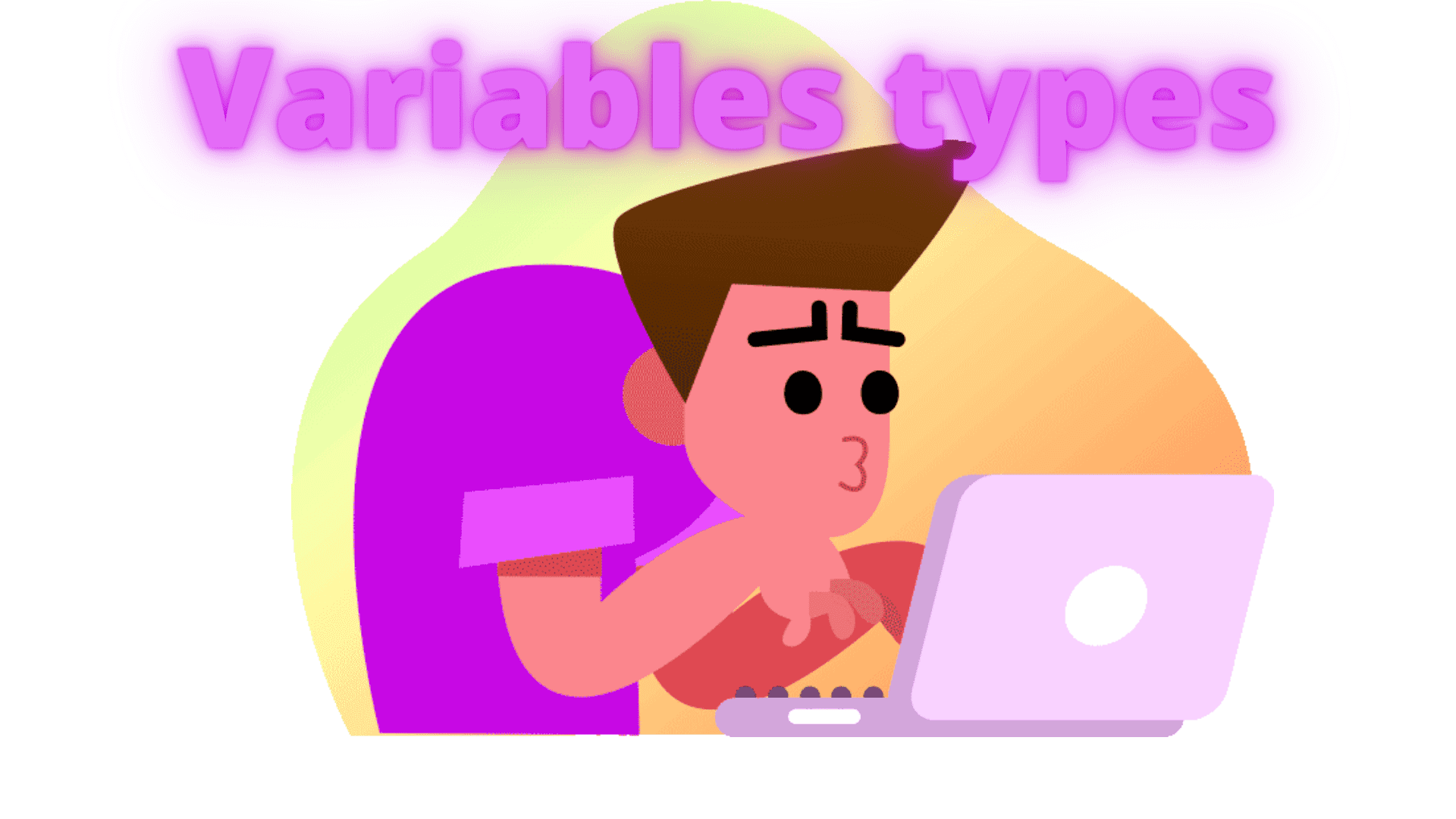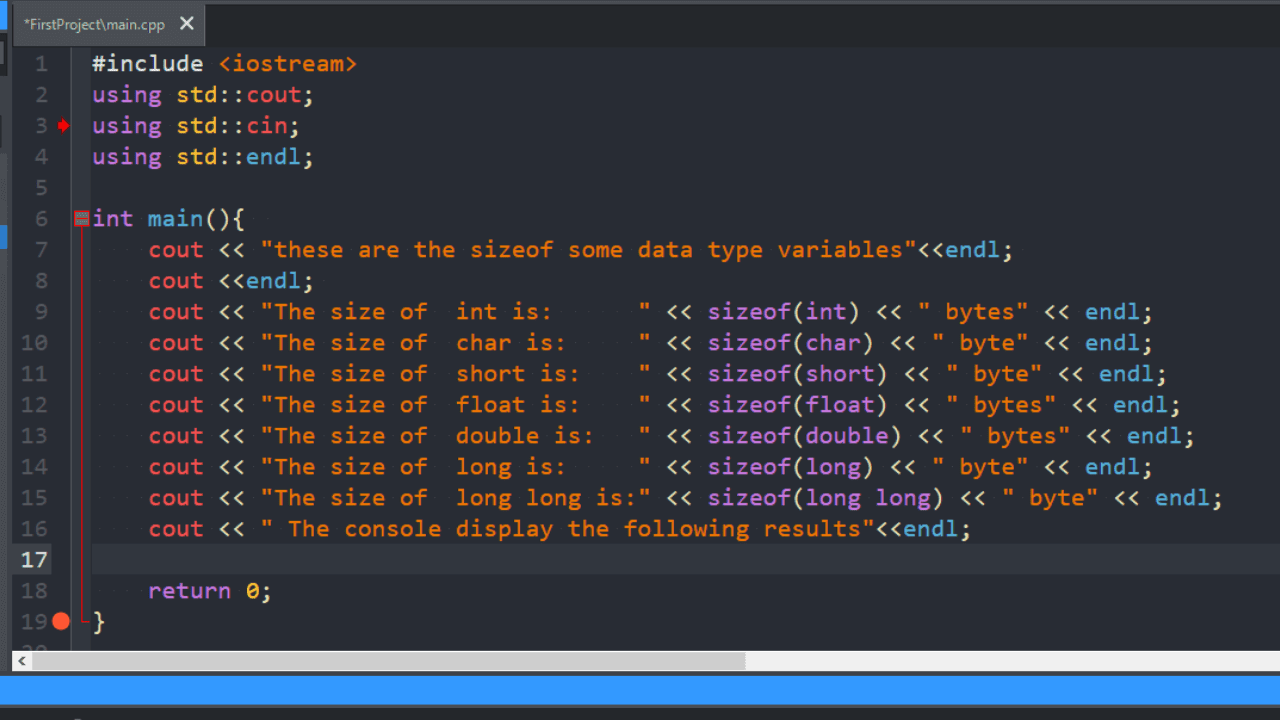Introduction
Variables are one of the core aspects of programming. They can have different types.Variables can be built into the code or inserted as needed.
In the Article Types of variables in c++ guide, I will focus on every Theoretical concept with examples related to the topic.
The basic architecture of a typical computer
Architecture of a typical computer
The basic architecture of a typical computer is made up of the following components.Processor: the brain of the computer that executes programs and performs calculations.Memory: a chip or set of chips that stores data and instructions.Storage: a device such as a hard drive, flash memory, optical disc, or magnetic tape that holds data for long periods.Input devices: devices such as keyboard, mouse, touchpad, and microphone through which people enter instructions to be executed by the computer.Output devices: devices such as monitors, printers, and speakers through which information is displayed or given out in audible form (for example, sound).
Movement data between CPU and memory
A CPU is a processing unit that is typically connected to a motherboard and other components. In a computer, the CPU processes data, which is then stored in the memory.
The movement of data between the processor and the memory is called data caching. Data caching can be divided into two types:
- Write-back cache
- Write-through cache
The write-back cache modifies its copy of the data in memory before sending it to the main storage device, while the write-through cache does not modify its copy in memory before sending it to the main storage device.
Memory locations

Memory locations are the physical addresses in the computer’s memory where programs and scripts are stored.
The location of these memory locations varies depending on what is stored in them, but they all have a unique address that identifies them from all the other memory locations in the system.
Types of variables in c++ guide
Variables: What are They?

Variables are a way to store information in a computer program. Variables store data in the form of a name and an associated value.
A variable name comprises letters, digits, and underscores but cannot start with a digit. Variables can be assigned values by using the assignment operator ( = ).
Variables store data that might change during the program’s execution.
Variables: Why are they important?
- Variables are important in programming because they store information and change the program’s behavior.
- Variables can be defined as a container that stores data, which is used to control the program’s execution.
- Variables are essential because they allow the programmer to change the input and get different outputs.
- Variables are important in programming because they allow programmers to create robust and reusable code.
Declaring and initializing variables
Variables are containers for data. They can be used to store numbers, text, and even other variables.Variables are declared with the assignment operator ( = ).
For example:int myAge; //declares a variable called “myAge”myAge = 17; //assigns the value of 17 to the variable “myAge”The default data type for a variable is int.
Variables of other types can be created by appending a letter after the name of the type. For example: int age = 28; //declares an integer called “age” and assigns it a value of 28 char c = ‘x’;
//declares a character called “c” and assigns it a value of ‘x’ Data TypesVariables may be declared to contain data types such as int, char, float, or string. An integer is a whole number such as 1, 2, and 3. A floating point number can be 0.
Naming C++ variables
Naming C++ variables is a skill that can be learned and perfected. It is a skill that will make you a better coder.
One of the most meaningful aspects of naming variables is to give them appropriate names. The name should describe what the variable does and how it is used.
The following are some best practices for naming C++ variables:
– Use descriptive names for variables in your code, such as “number_of_items” or “date_of_birth”- Use nouns, verbs, adjectives, or adverbs when naming variables- Use meaningful names and avoid using abbreviations in variable names- Avoid using numbers in variable names unless they are part of an abbreviation such as “hour” or “year.
C++variables examples
Variables are containers for data. The data can be of any type, but the variable must be set to the same type as the data it will contain.#include<iostream>using namespace std;int main() {int score = 5;score = 6; //assigning a new value to a variable with an initial value of 5cout<< “score is “<< a<< endl; //printing out the value of variable a to screen}
Local and global variables
Variables are the containers that hold values. Variables can be global or local.A global variable is a variable that is accessible from anywhere in the program. It can be used by any function in the program.
A local variable is a variable that is only accessible from within the function where it was declared.Global variables are often used to store values that are needed by several functions in a program.
In contrast, local variables are often used to store temporary values which need to be accessed only within one function or block of code.
C++premitive data types
Primitive data types are the building blocks of C++ and are used to store data in memory.Primitive data types can be classified as follows:
- Integer
- Floating point
- Double Floating Point
- Boolean
- Valueless or Void
- Wide Character
Integer types
Integer types
*signed short int their size is at least 16 bits*signed int their size is at least 16 bits*signed long int their size is at least 32 bits*signed long long their size is at least 64 bits*unsigned short int their size is at least 16 bits*unsigned int their size is at least 16 bits*unsigned long int their size is at least 32 bits*unsigned long long int their size is at least 64 bits
Floating point type
Floating point numbers are a subset of real numbers, meaning that they can represent any number that an actual number can convey. This type of number is also called a “floating-point” number.
Size of a variable sizeof
The size of a variable is also determined by its scope. The scope determines how much space the variable will take up in memory.
C++ code that displays the size of some variables
The code

#include <iostream>using std::cout;using std::cin;using std::endl;int main(){ cout << “these are the sizeof some data type variables”<<endl; cout <<endl; cout << “The size of int is: ——> ” << sizeof(int) << ” bytes” << endl;cout << “The size of char is: ——> ” << sizeof(char) << ” byte” << endl;cout << “The size of short is: ——> ” << sizeof(short) << ” byte” << endl;cout << “The size of float is: ——> ” << sizeof(float) << ” bytes” << endl;cout << “The size of double is: ——> ” << sizeof(double) << ” bytes” << endl;cout << “The size of long is: ——> ” << sizeof(long) << ” byte” << endl;cout << “The size of long long is:——> ” << sizeof(long long) << ” byte” << endl;cout << ” The console display the following results”<<endl;return 0;}
Interpretation
The console display the following results:The size of an int is ————> 4 bytesThe size of a char is ———-> 1 byteThe size of a float is ———–> 4 bytesThe size of a double is————-> 8 bytesThe size of a long is ————> 4 bytesThe size of a long long is————> 8 bytesTake noticeThese results may be different depending on your operating system.
Conclusion

In conclusion, C++ variables are a powerful tool for any programmer. They can be used for types of things and can be manipulated in different ways.
However, it is essential to remember that C++ variables are an integral part of the programming language and are used to store values in memory.
A variable is a storage location in the computer’s memory to store data. It is a name given to a specific value, which can be changed anytime.
